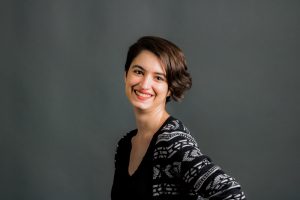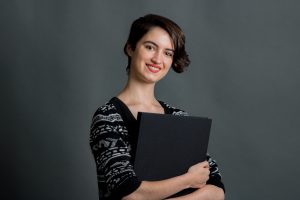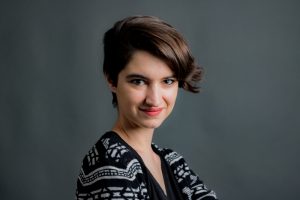Tags
Related Posts
Share This
CWL Senior Madeleine Sardina

Madeleine Sardina graduates in December. Photo by Chris Dorantes
Jackalope Magazine continues talking with Santa Fe University of Art and Design’s Creative Writing and Literature seniors as the second half of the semester begins. The leaves are changing colors, pumpkins are being carved and students aren’t sure which is scarier: things that go bump in the night or revising their senior manuscripts. Madeleine Sardina, CWL student and vice president of Student Writers Association, is hard at work on her senior book and grad school applications. She has been awarded in Glyph, placed second in Santa Fe Reporter’s 2015 fiction contest and will be featured in the fall issue of Psychopomp Magazine. She sits down with Jackalope Magazine and discusses her inspirations, her writing style and her favorite things to read.
Jackalope Magazine: Can you tell us about your senior book?
Madeleine Sardina: My senior book is a lot of myth stuff that I kind of reinvented to be, I don’t know, less misogynistic than a lot of them are. But also I picked a lot of really feminist myths. It’s a lot of mythology that has to do with feminine power and isolation and trying to find a sense of place when you’re stuck in a place that you don’t want to be.
Have you always been into mythology?
I’ve always been interested in mythology. In seventh grade I was in a Greek mythology bee. I think there were like 10 of us, like there was no one, but I was in the final round. I think it was me and some other guy. I don’t remember which question tripped me up. There were several rounds and I was just hitting it out of the park. It obviously got harder as people got eliminated; I got second place in it. But yeah, I’ve always been into mythology. I really liked the Percy Jackson series and all of that stuff when I was younger.
What’s so special about mythology?
I really like stuff that’s magical and mythology feels really magical to me, because there are beings that aren’t human that explain a lot of natural phenomena. I think that’s really cool. I was also really into the idea of people becoming animals, and that’s a really big part of mythology, either permanently becoming an animal or being able to change back and forth and stuff like that…That’s also a thing in my book: transformation, and people turning into animals and having to deal with that. I just really like the magical nature of mythology and all of the history behind it, too.
What else inspires you as an artist?
Books that have really lyrical writing and really have an emphasis on language are a big inspiration for me, because that’s the kind of writing that I like to do and that’s how I learn to be better at it. Like Anne [Valente]’s writing and Matt Bell’s writing. In the House Upon the Dirt Between the Lake and the Woods–I read that between Techniques of Fiction and Intermediate Fiction, like over a year–and I think it helped a lot with figuring out how to write lyrically like that for a sustained amount of time. The whole novel is like super in depth with language and everything. I think reading books like that helps me figure out how to write like that.
What is your favorite book?
I have had this answer in my back pocket for as long as I’ve been asked it, probably. Just because it’s such an overwhelming question and I used to be like, ‘no I can’t answer that’ but now I have an answer. And it’s Scorpio Races by Maggie Stiefvater, which is about water horses, or kelpies, which is what I wrote about for one of the Glyph pieces I submitted and got like second place for. It’s just so beautifully written and and so lyrical, and it’s about this myth of horses who live in the ocean and kill people; I thought that was awesome. Scorpio Races itself is about how the horses come out and the people try and catch them and tame them and race them. It’s like a horse race on a beach, and then if you fall, you die because you get eaten by these horses. So people die. I think the first line of the book is like, ‘Today is the first of November, which means someone will die.’ or something like that. It’s such a badass book…everything about it is my favorite thing, I reread it all of the time.
Is fiction the main genre you want to focus on?
Yeah, that is the genre I want to focus on. I like nonfiction a lot, especially since I’ve learned to have more fun writing it and not write like super rigid, but fiction my thing.

Madeleine Sardina’s genre of choice is fiction. Photo by Chris Dorantes
Why Santa Fe?
I met with some representative at a college fair and I had never heard of SFUAD before. I was mostly thinking about going to University of Arkansas because they have a good MFA creative writing program and I thought that was their undergrad creative writing program. I didn’t know that it was MFA. So I met with the SFUAD person and she made her pitch, I don’t remember who it was. I really love New Mexico because my family comes to visit New Mexico all the time. We vacation a couple hours north of here in the summer, so I’ve always really loved New Mexico. So I was like, ‘yeah, I’ll check that out’ and my parents thought Santa Fe was a beautiful place, so they were like, ‘yeah, let’s go do a college visit.’
Then I came here, and I met with Dana [Levin], which I feel like that’s so many people’s stories: meeting with Dana and her being like, ‘this place is amazing’ and everyone agreeing because how can you disagree with Dana. She’s the one who was like, ‘oh yeah, you could go to Arkansas or you could go to Arizona or wherever, but those are grad programs that they’re mostly advertising for, and you could major in English and sort of emphasis in creative writing, but this is one of the only places that you can actually major in creative writing as an undergrad.’ And that’s what I was mostly interested in. I like English, but I wanted to write creative stuff; I didn’t want to be immersed in academic writing. So that was pretty much what sold it for me.
I also thought Santa Fe was beautiful and the campus was beautiful and I felt really at home immediately when I came and did the college visit…I was like, ‘I really love it here, I would love to spend four years here.’ And that’s still true. You know, I’m older now and I’ve learned things about Santa Fe, where I’m like, ‘OK, it’s kind of sleepy and boring,’ but I’m so happy that I stayed here and that I’ve lived here for four years.
How has your writing changed since you’ve been at SFUAD?
One of my pieces in my senior book is something that I wrote my first semester here in Techniques of Fiction, and it was like trying to be what my style is now. But because it was three years ago, it was not good…I mean it was terrifying to read again, but it was also really nice to be like, ‘oh, I’m at where I was trying to get.’ So it’s also motivating to be like, ‘oh, at some point in the future I’m going to reread my senior book and realize that I was trying to get to where I am four years from now.’ So a lot of my style has developed into something that it was trying to be. I’m proud of that.
What is your writing process like?
I always write with music playing, usually something related to what I’m writing. I like making playlists for stories that I listen to while I’m writing them because it gets me in the right mood and puts a lot of images in my head that I want to include in a piece. I also get way more done when I’m in ‘writerly spaces’ like libraries or coffee shops. I can spend six hours writing at Java Joe’s; it’s wild. And I like having a warm drink, like coffee or hot cocoa. I think it helps me feel like a real writer so I can trick myself into actually writing.
What was your experience like working on Glyph?
It was awesome. Last semester, I think we had a really great group. We did a really great job, especially because we were so stressed about it being the last Glyph, which thankfully it’s not going to be…I really loved getting to read so many things. We had like 200-something pages of submitted material, and I thought that I would recognize way more of it than I actually did. I barely recognized any of it. Because it’s such a small school, you feel like you’ve read everyone’s stuff. There was so much in it that was new, and it got me so much more interested– I was already interested–in editing for lit magazines, because I was like, ‘I really want to to be surrounded by work like this all the time and be able to read all of this stuff.’ So it was really exciting to be able to be immersed so much in other people’s work.

Madeleine Sardina hopes to attend grad school next fall. Photo by Chris Dorantes
How do you feel about submitting to literary magazines?
That is probably one of my favorite things about being writer, just how easy it is to just send your writing out there. Even if you get rejected a bunch, because you do, because that’s how it is, it still feels really good to be part of that. So like submitting to Glyph and then getting your work put in a book, if it’s like a physical magazine it’s amazing to be able to turn to a page and be like, ‘that’s my name, that’s what I wrote.’
And then I go through phases, or whenever a bunch of magazines will have their reading period open I’ll submit to like 10 magazines in a day and be like, ‘I’ve done so much work today, even though all I’ve done is press like three buttons over and over, oh wow, I’m such a good writer.’ It feels really productive to just send your work out to a bunch of different places. It’s also really stressful because you’ll reread the thing and realize there are seven typos in it and you just sent it to a bunch of people, and you’re like, ‘can I take it back?’ But no, I love submitting to places and it makes me really happy even when there are rejections; it still feels productive. Now I know I can work on this, or try to send it to another place and try to find a better home for it.
What has your experience been like with SWA?
Awesome also. Last semester was my first semester as an officer, so I got to work with Amaya [Hoke] who is flawless, and then Kylie [Yockey] of course, who is also flawless. Two beautiful presidents. And then Brianna [Neumann] and Judy [Ripley] and it was such a great group of gals to just be able to make all of the stuff that we made happen. The writing marathon is one of my favorite things ever. Last semester it was so fun to stay up for 24 hours and just be surrounded by all these people who were excited to make art. And then this last one, being awake for 12 hours, like I never lose energy at those things. I always stay up the whole time. Beforehand I’m like, ‘I’m gonna do it, I’m gonna stay up the whole time because I just want to be able to say I stayed up the whole time.’ But I still never get tired, I still love being awake and hearing everyone talking and hearing everyone writing. Even if it gets quiet, hearing everyone typing is so nice. I just really love community stuff like that, and that’s exactly what SWA is about, so it’s really great to be part of that.
What class would you say has impacted you the most?
I think probably Intermediate Fiction. That was where a lot of my writing developed. Last semester, when I took Intermediate Fiction, is when most of my senior book happened. Even if it wasn’t in that class, the writing was influenced by that class just because we read so many really cool things in it, and Anne Valente is my hero. It was also my first workshop – I mean I took Advanced Nonfiction the same semester, but that was like the first semester that I had a workshop class since I had taken my beginner workshop classes. So it was nice to be able to work more in depth with longer fiction.
What are you planning on doing after graduation?
I’m hopefully going to go to grad school if I can get in, because I really love writing and learning about writing and reading, and that’s what grad school is. So I’m hopefully going to be going to grad school. And if not, I’m just going to take a year off and then reapply next year, I guess, and just focus on writing and making a little bit of money. But mostly writing. I would really love to just be a recluse in the woods, throwing things out into the world every once in awhile. That would be the dream, just to write and not have to exist in the actual world. But yeah, being able to live off of my writing pretty much is the end goal. And then just being able to write and live in the woods…that’s what I’ve been thinking about so much lately. Like, ‘one day I’ll just be able to live in the woods, never speak to anyone and then occasionally write something.’
This interview has been edited for style and clarity.






 Jackalope Magazine is the student magazine of Santa Fe University of Art and Design. Building on the interdisciplinary nature of our education, we aim to showcase the talent of our university and character of our city.
Jackalope Magazine is the student magazine of Santa Fe University of Art and Design. Building on the interdisciplinary nature of our education, we aim to showcase the talent of our university and character of our city.
0 Comments
Trackbacks/Pingbacks